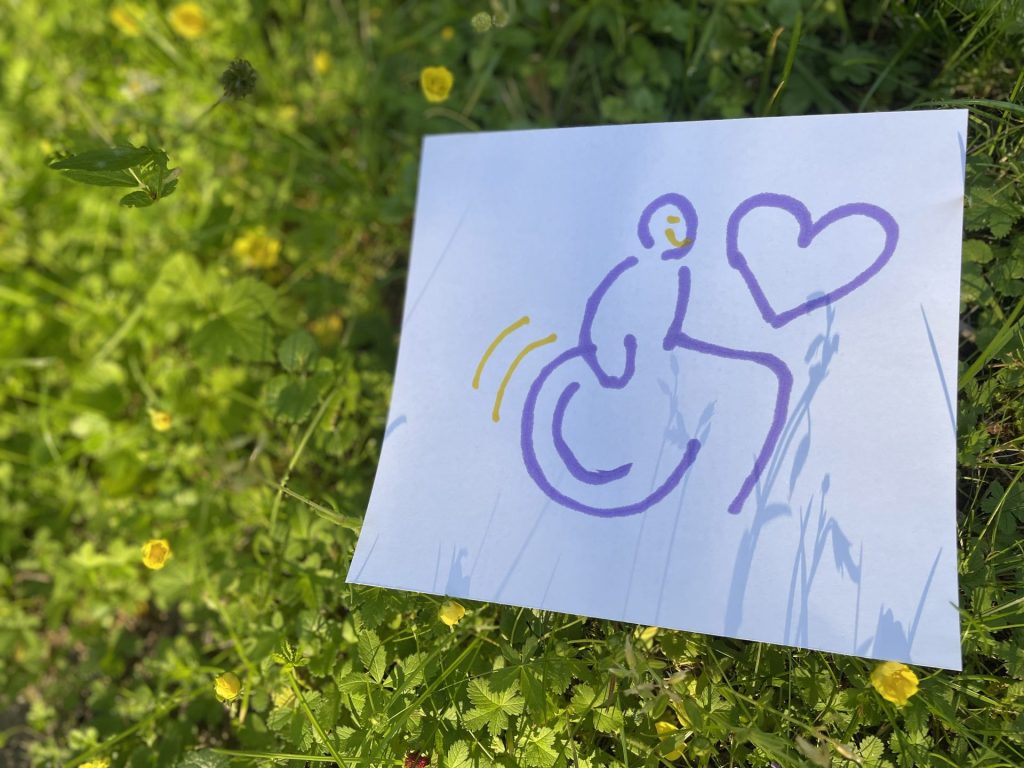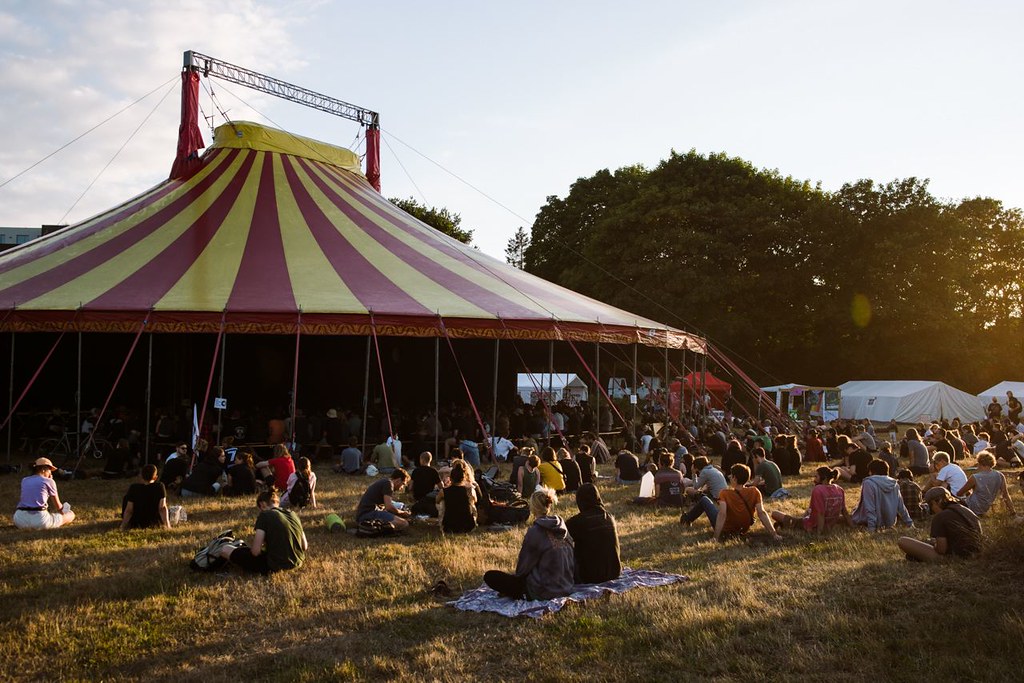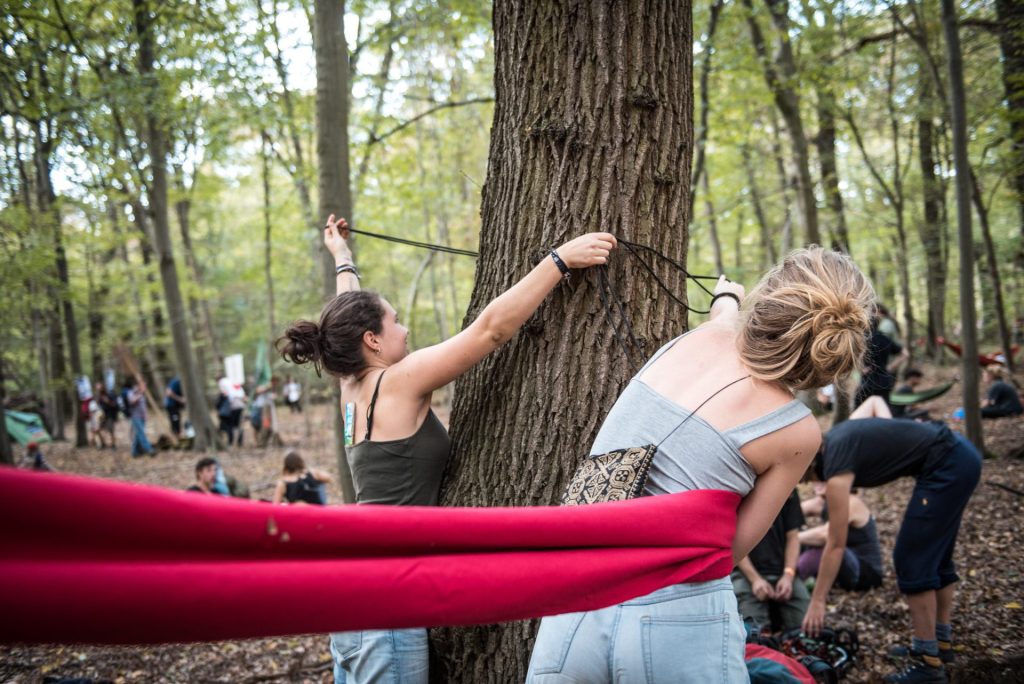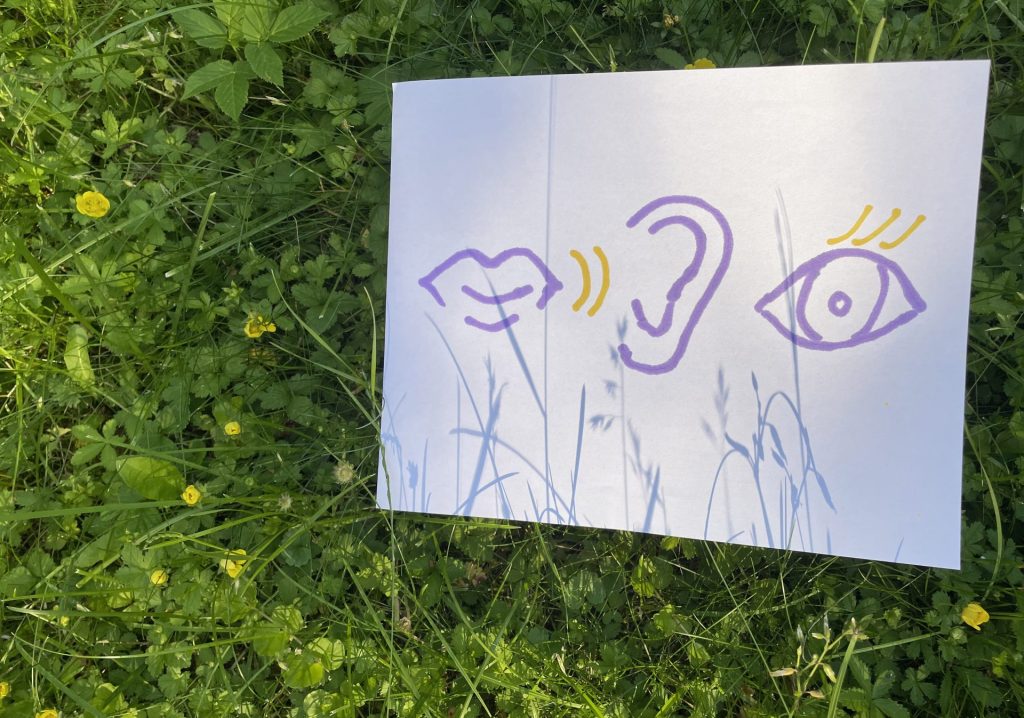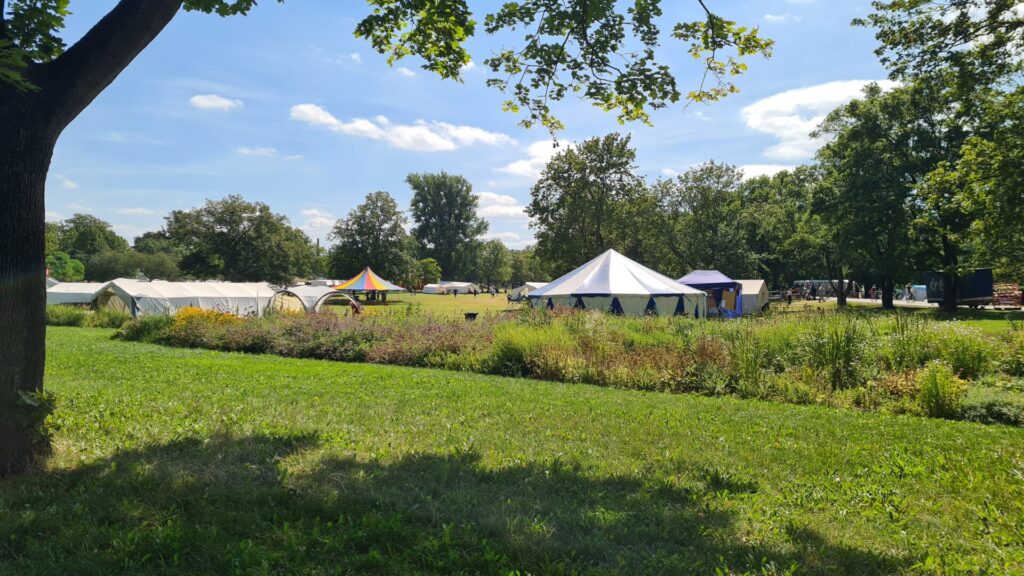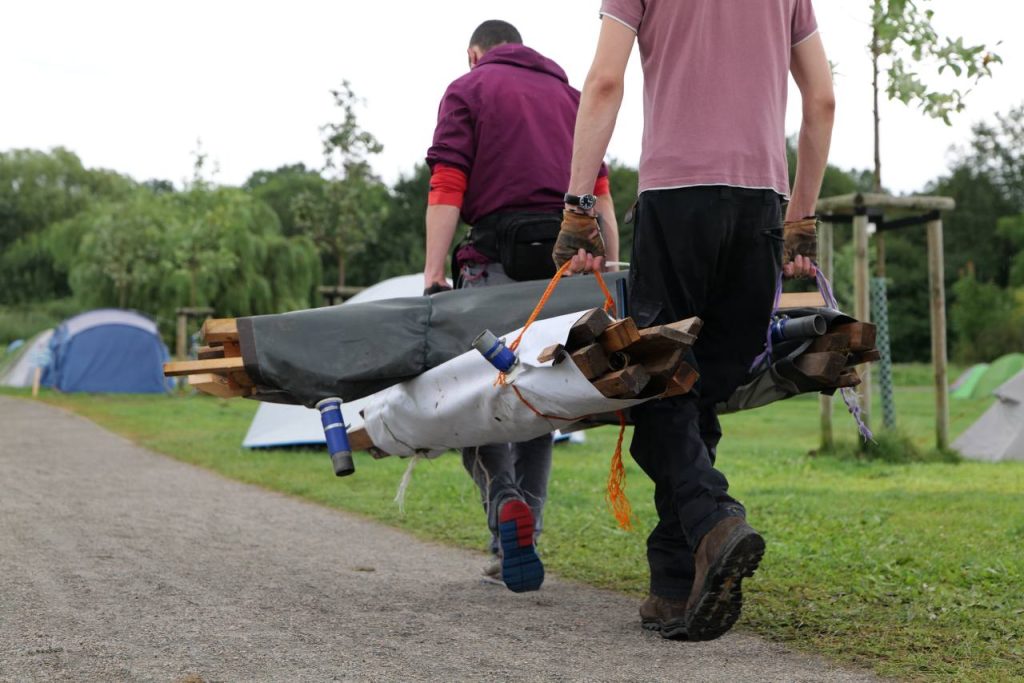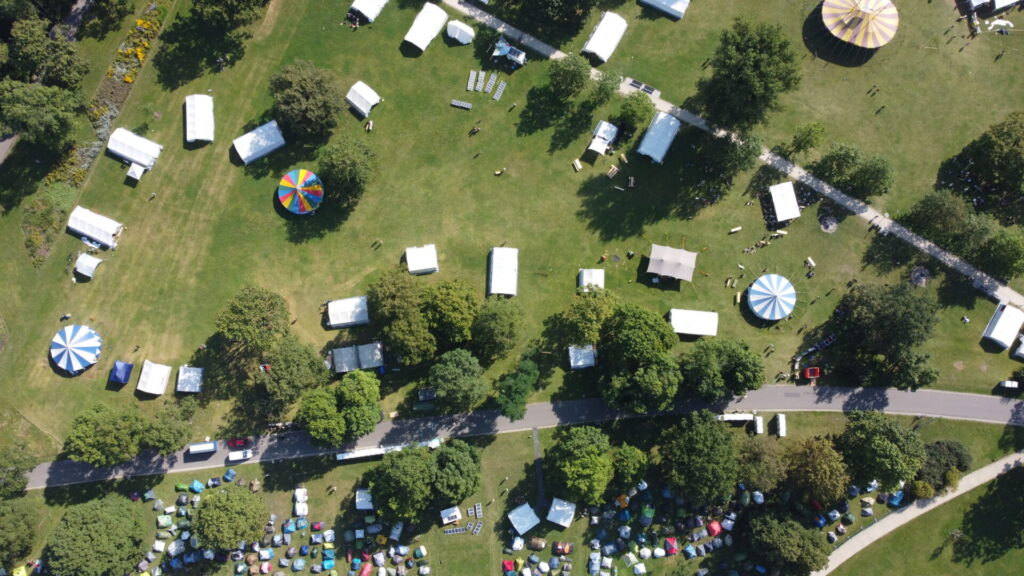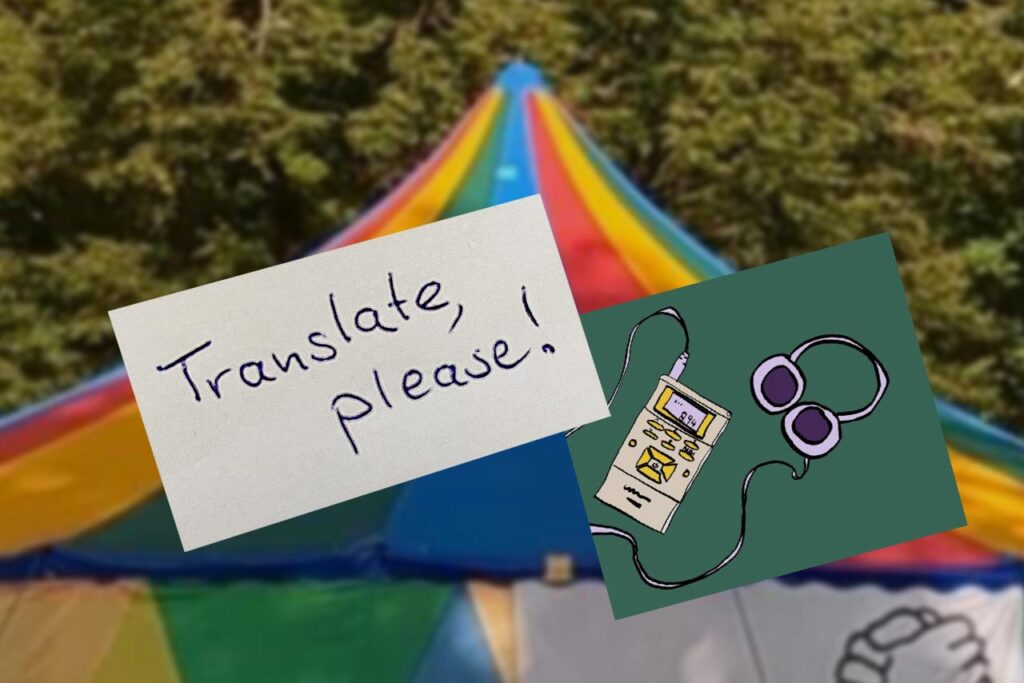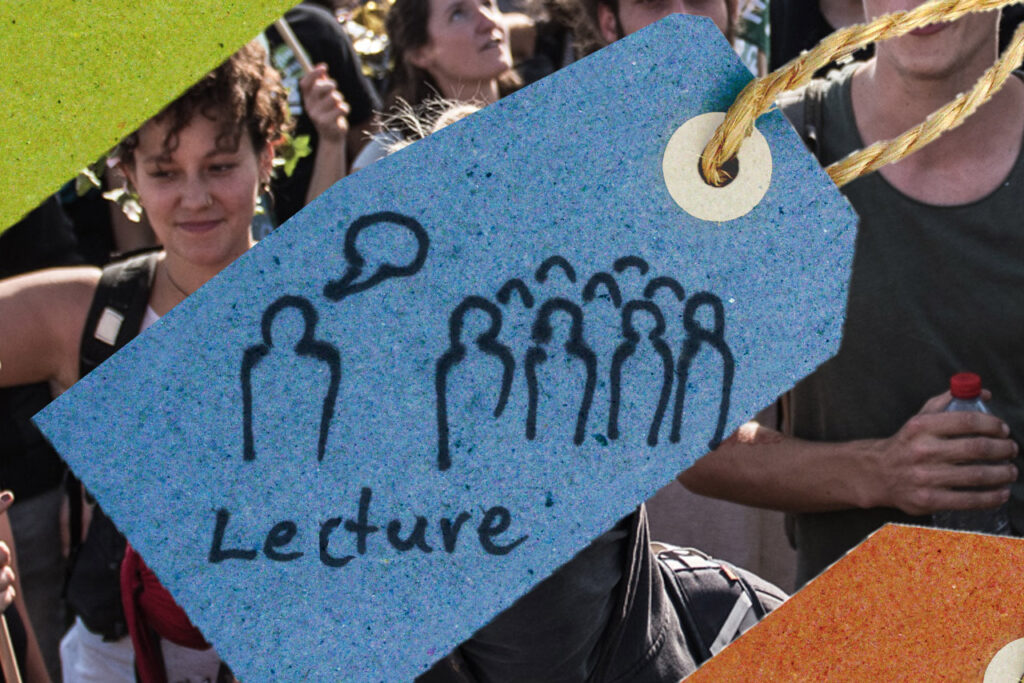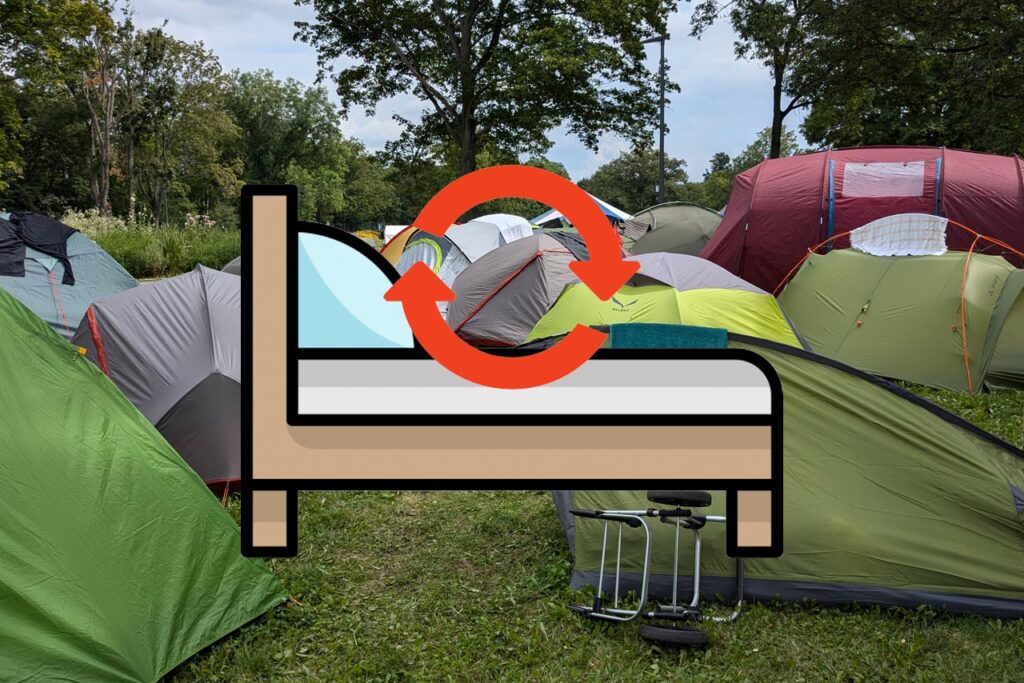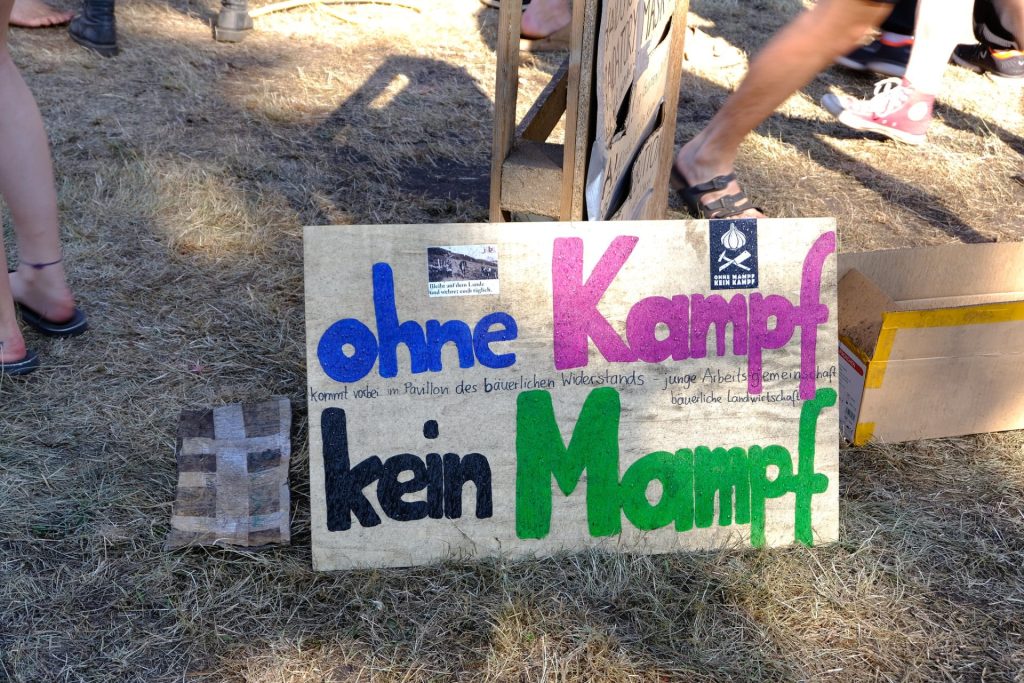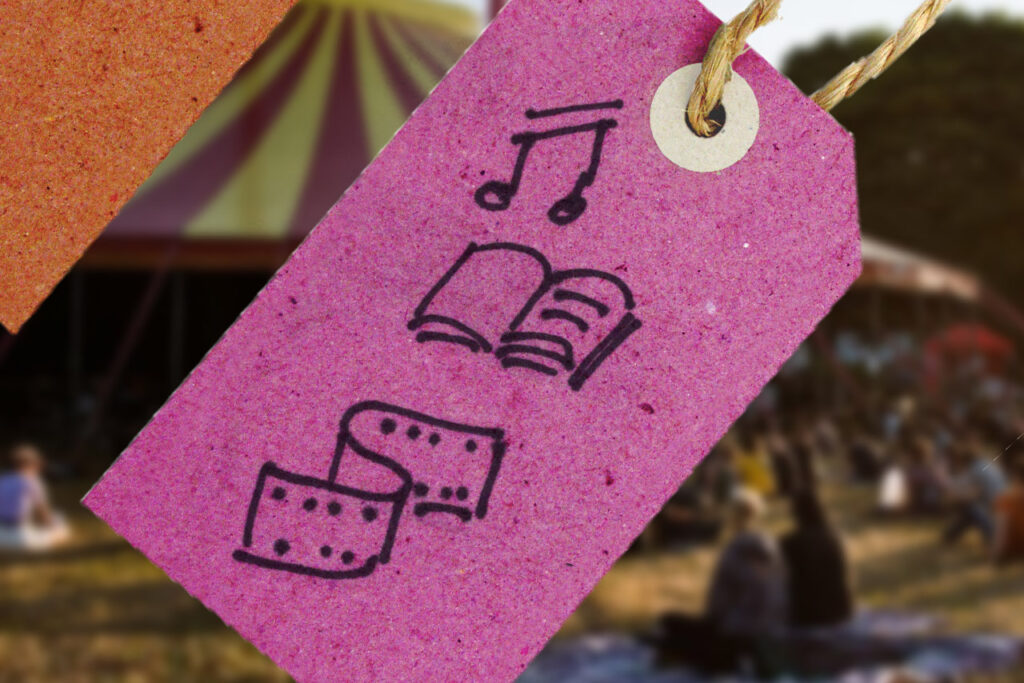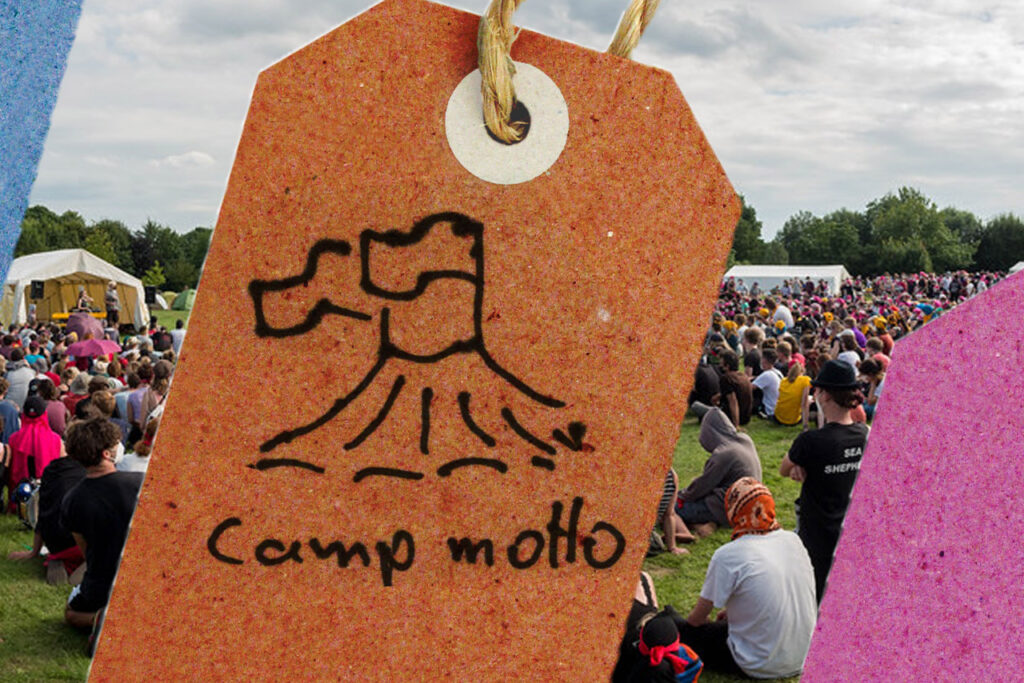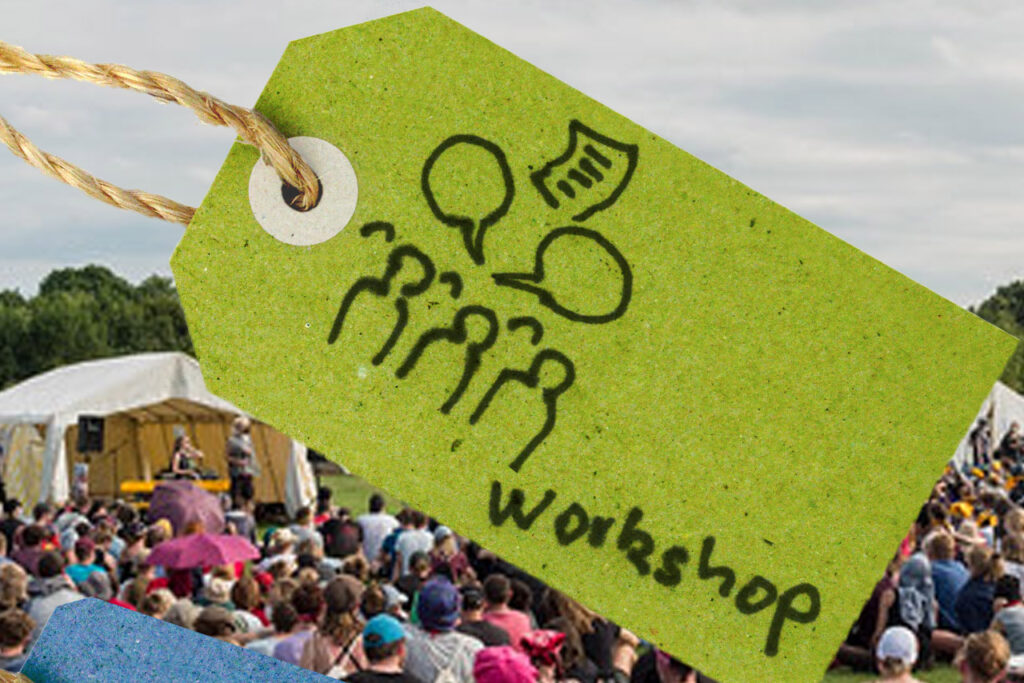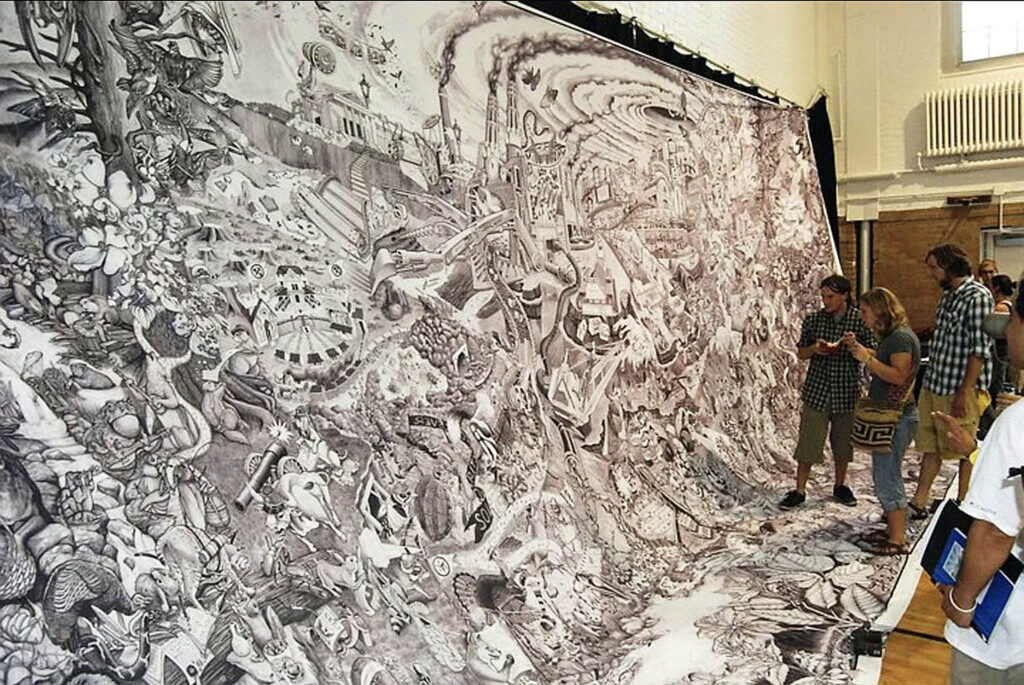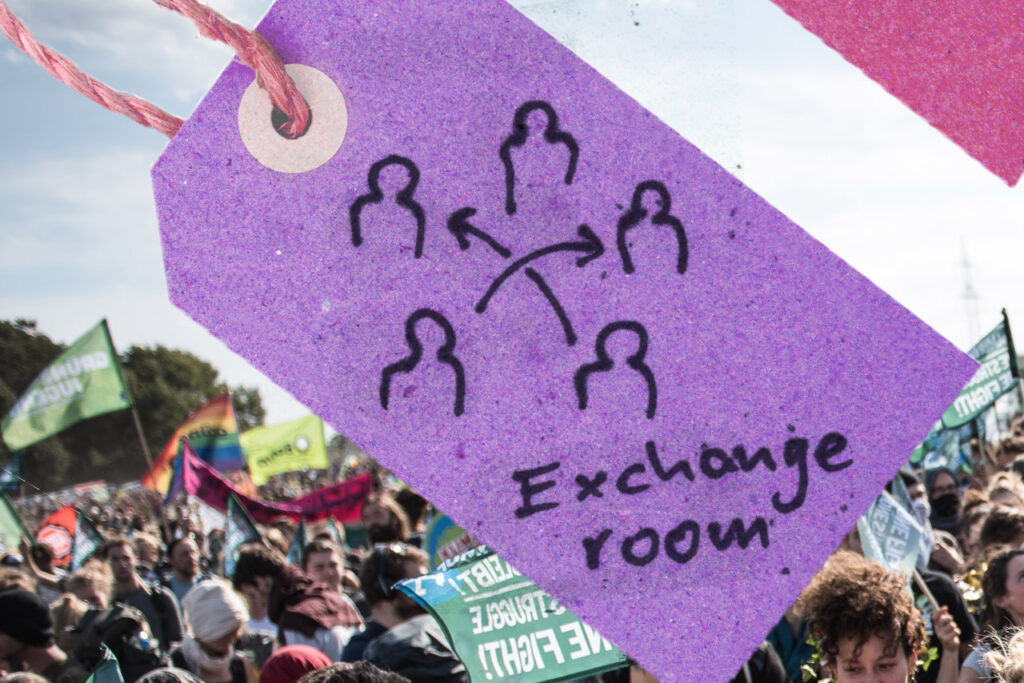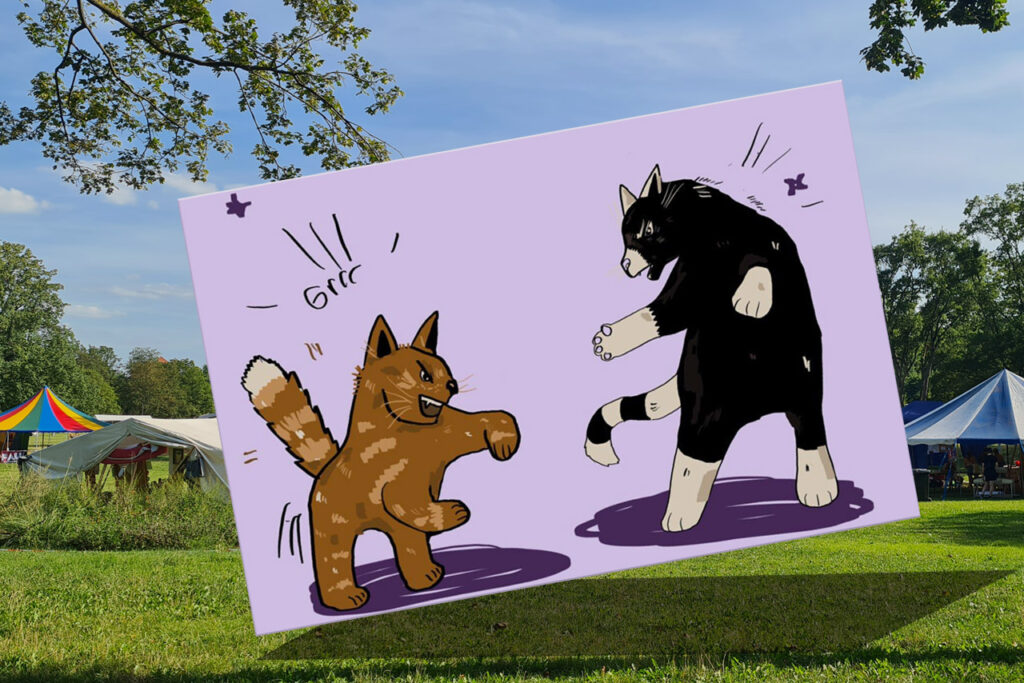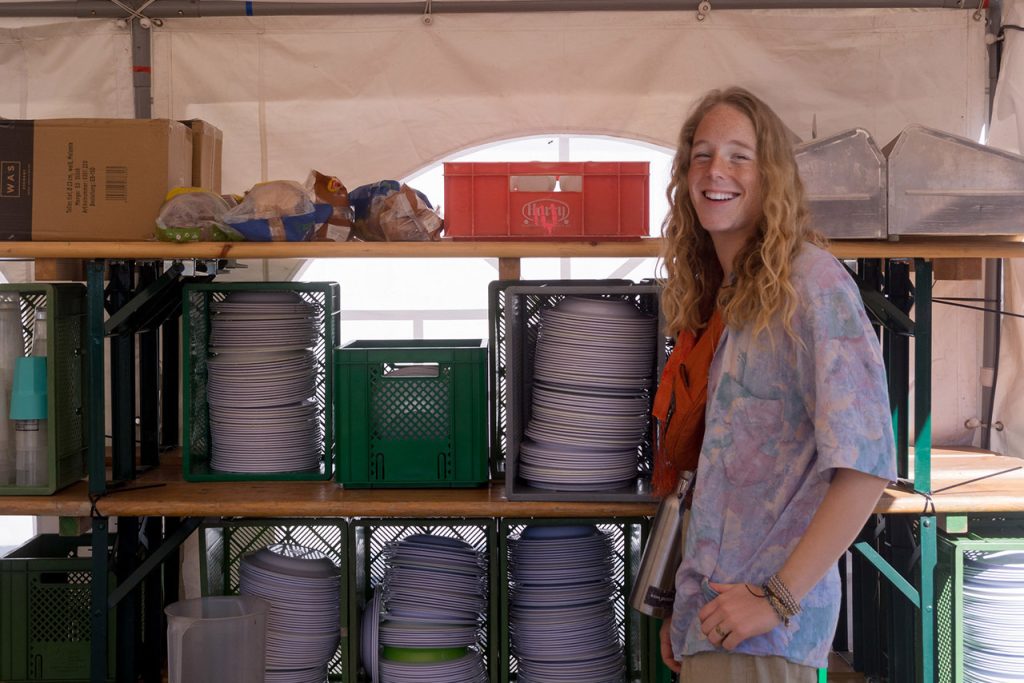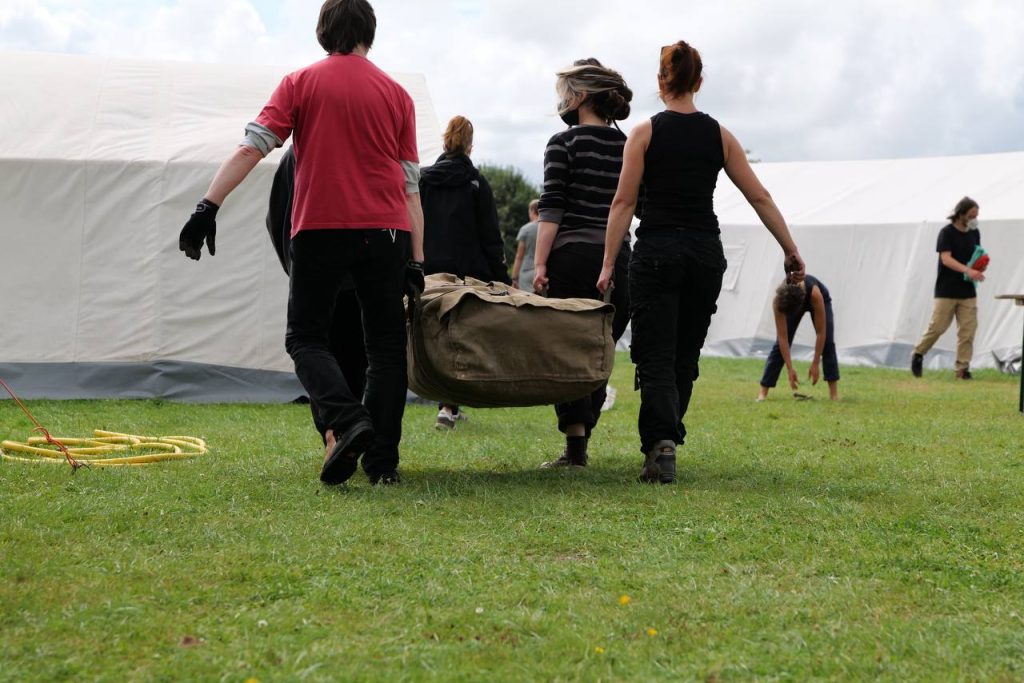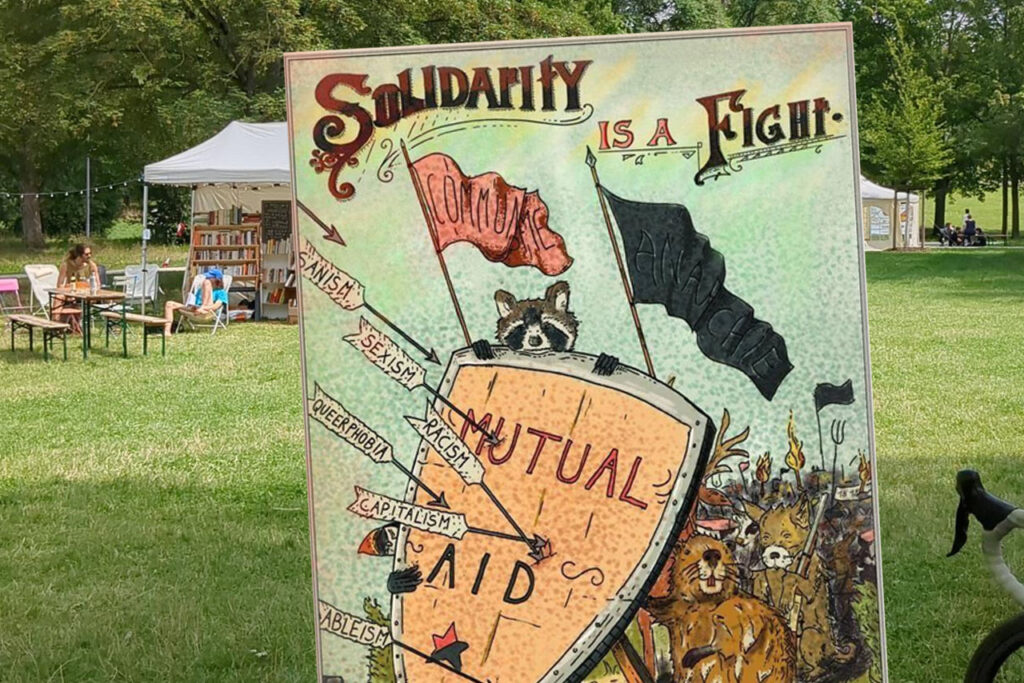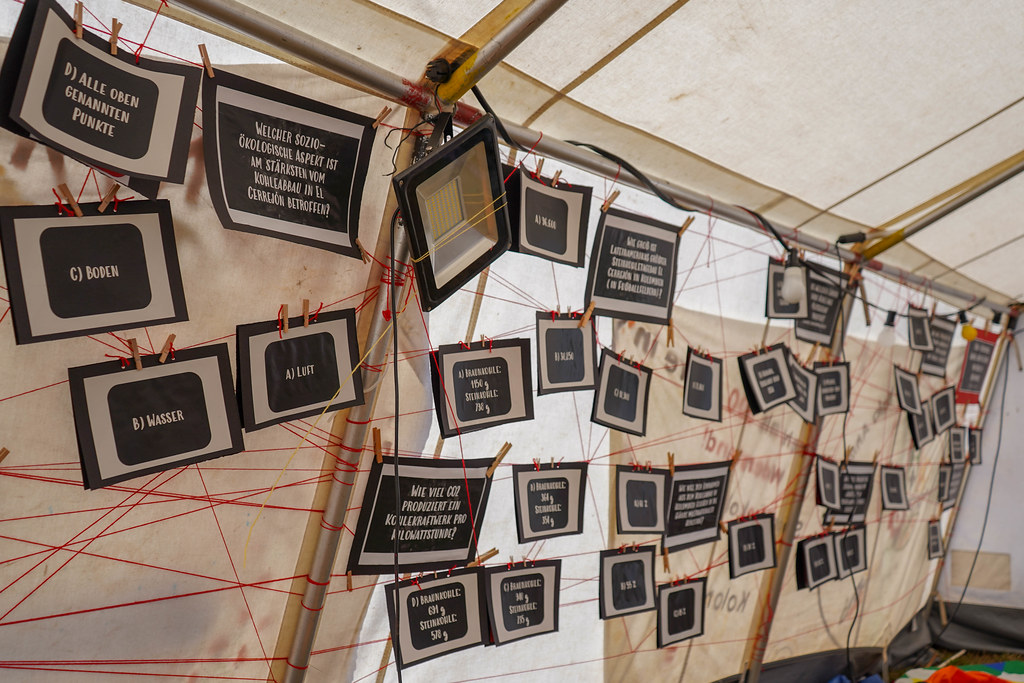In case you need particular support, please let us know about that before the camp via registration. That way we can be prepared. Also let us know if there is something missing that you would need to participate in the camp – we endeavour to get it (done). You can find our contact information under ‘registration of support needs’.
Here, you can download individual measures as PDF.
Below you will find the same information sorted in the drop-down menu.
Chronic diseases (PDF)
Deafness/ hard of hearing (PDF)Physical disablity (PDF)Learning difficulties (PDF)Neurodivergence (PDF)Psychosocial disabilities (PDF)Speech and communication impairments (PDF)
Blindness and visual impairment
Low-barrier registration
- Registration of individual support needs
- via encryted form (you will be redirected to a Cryptpad form via the link)
- via telephone: every tuesday, 14:00-16:00 at +49 163 9799864
- via e-mail:
Information
- Information on the area on our website (e. g. site plan, location of rest areas, shaded areas)
- Information on the program prior to the start of the camp on our website (incl. meal and break times)
- Assistance with packing through checklists
- List of barriers on our website
- Website is compatible with screen readers
Arrival, departure and orientation
- Support person for arrival and departure
- Contact persons from the inclusion team on site
- Option of camp guidance by assistants
Infrastructure
- High-contrast marking of steps and obstacles
- Tent marking with pictograms
- Camp signage with large lettering and high contrast
- Water points and dog waste bags for guide dogs
- Preferred spots at the bed pool for overnight stays in apartments in Frankfurt
Mobility
- Shuttle/ accompaniment to the camp
- Provision of assistance in everyday camp life (e.g. accompaniment between camp locations and help with orientation)
Program design
- Provision of materials in accessible formats (large print, digital)
- Sensitization of speakers to the description of visual presentation elements
- Possibility to use assistive technologies in all workshops
- Program and event descriptions as screen reader compatible PDFs
- Program changes will be communicated via Telegram channel
- Reserved seats in the front row
Communication
- All camp information in digital text form, compatible with screen readers
- Descriptions of the surroundings
- Low-barrier camp guide in various formats (audio, large print, digital)
- Training of helpers in dealing with visually impaired and blind participants
- Permanent availability of inclusion team during the day and evening via public telephone
Feedback
- Opportunities for feedback via e-mail or telephone so that we can improve our offer in subsequent years
⚠️ Remaining barriers
- Obstacles that are difficult to recognize, such as tent cords or pegs
- No tactile guidance systems at the camp
- Little to no information in Braille
- Arrival: Long way (approx. 1 km) from a low-barrier public transport stop to the camp
Chronic Illnesses
Low-barrier registration
- Registration of individual support needs
- via encryted form (you will be redirected to a Cryptpad form via the link)
- via telephone: every tuesday, 14:00-16:00 at +49 163 9799864
- via e-mail:
Information
- Information on the area on our website (e. g. site plan, location of rest areas, shaded areas)
- Information on the program on our website (incl. meal and break times)
- Assistance with packing through checklists
- List of barriers on our website
Arrival, departure and orientation
- Support person for arrival and departure
- Contact persons from the inclusion team on site
Infrastructure
- Extra camp area with short distances to toilets, water, program tents and kitchen
- Extra quiet camp area
- Designated retreat tents with peace and quiet, shade and mattresses or loungers if required
- Refrigerator for medication
- Noise protection headphones available to borrow
Mobility
- Provision of assistance (e.g. carrying loads, accompaniment when exhausted)
- Loanable aids such as folding chairs, wheelchairs, etc.
Food
- Allergy friendly ‘kitchen for all’ that takes allergies or intolerances into account
- Free drinking water at several locations
Program design
- Diverse program content
- Clear program booklet with instructions
- Participation should take place without pressure to perform
- Possibility to lie down, also in workshop tents
- Easy participation over shorter periods or with interruptions
- Reserved seats in the front row
Communication
-
Permanent availability of inclusion team during the day and evening via public telephone
-
Sunflower buttons as optional identification symbols for invisible disabilities
-
Awareness team can provide support during health crises, pain episodes, exhaustion, etc.
Feedback
- Opportunities for feedback via e-mail or telephone so that we can improve our offer in subsequent years
⚠️ Remaining barriers
-
Mobility: We endeavour to make the site as accessible as possible. However, we cannot guarantee short or well-surfaced paths for everything.
-
Weather:
-
Rain: The camp takes place outdoors. Although all programme points and important locations are covered, too much rain can make the paths difficult to walk on.
-
Heat: We have a number of measures in place to counteract the heat, such as lots of trees, covered tents and sufficient drinking water. However, we can’t do much more in hot weather.
-
- Quiet: The camp is a busy place. Absolute peace and quiet will not be possible despite hearing protection.
Deafness/ hearing loss
Low-barrier registration
- Registration of individual support needs
- via encryted form (you will be redirected to a Cryptpad form via the link)
- via telephone: every tuesday, 14:00-16:00 at +49 163 9799864
- via e-mail:
Information
- Information on the area on our website (e. g. site plan, location of rest areas, shaded areas)
- Information on the program prior to the start of the camp on our website (incl. meal and break times)
- Assistance with packing through checklists
- List of barriers on our website
Arrival, departure and orientation
- Support person for arrival and departure
- Contact persons from the inclusion team on site
Communication
- Permanent availability of inclusion team during the day and evening via public telephone for questions, support, arrangement of assistance
- Assistance for everyday life can support with communication (probably not sign language)
- METACOM materials for communication support can be borrowed
- Sunflower buttons as optional identification symbols for invisible disabilities
- Buttons for “I feel like talking” and “I don’t want to be spoken to”
- Announcements are always also communicated in a Telegram group
- Carer as support in dangerous situations
- If desired: Buddy as a social and emotional attachment figure
Program design
- Induction loops for hearing aids/ CIs to which the speaker’s speech is transmitted
- Automated subtitling
- Sensitization of speakers to speak slowly and clearly. We encourage the use of methods with a variety of expressive possibilities (e.g. drawing, showing, writing). Spoken content should be supported by visual elements.
- Speakers and participants are sensitized not to speak out of turn at the same time. Hand signals in plenary sessions, such as the need for pauses, language comprehension or speaking contributions, are explained and used in group discussions.
- Reserved seats in the front row
Feedback
- Opportunities for feedback via e-mail or telephone so that we can improve our offer in subsequent years
⚠️ Remaining Barriers
-
No full interpretation into easy language, sign language or foreign languages
-
Not all participants & helpers are trained in accessible communication
-
Much of the information is in written language
-
Loudness or stimuli at the camp can make communication difficult
-
Everyday assistance is not always immediately available
Physical disabilities
Low-barrier registration
- Registration of individual support needs
- via encryted form (you will be redirected to a Cryptpad form via the link)
- via telephone: every tuesday, 14:00-16:00 at +49 163 9799864
- via e-mail:
Information
-
Information on the area on our website (e. g. site plan, location of rest areas, shaded areas)
-
Information on the program prior to the start of the camp on our website (incl. meal and break times)
-
Assistance with packing through checklists
- List of barriers on our website
Arrival, departure and orientation
- Support person for arrival and departure
- Contact persons from the inclusion team on site
- Parking close to the camp, 1 km walk to the camp by public transport
Infrastructure
- Low-barrier paths; stable, level surfaces, no stairs without alternatives
- Preferred spots at the bed pool for overnight stays in apartments in Frankfurt
- Campsites in quiet and easily accessible locations
- Sleeping tents with groundsheets and camp beds
- Extra tent for nursing care
- Barrier-free sanitary facilities nearby
- Barrier-free kitchen for all/ food counter
- Low-barrier shifts are marked as such in the shift plan
- Safety: level escape routes, emergency plan incl. assistance for people with limited mobility
- Safer Spaces onn the camp
- Rest tents and retreats
- Water points and dog waste bags for guide dogs
- Refrigerator for medication
Assistance
- Provision of assistance in everyday camp life (e.g. for pushing a wheelchair to event locations, handing over items, chopping food or accompanying between camp locations)
- Provision of assistance for nursing care (support for general hygiene, transfers and use of aids) – Please register in advance! Then we can discuss details. 🙂
- Permanent availability of inclusion team during the day and evening via public telephone
Program design
- Workshops in which disabilities are taken into account during physical activities
- Clear daily structure with sufficient breaks
- Reserved seats in the front row
- Indication of barriers in the program overview
- Possibility to lie down, also in workshop tents
Communication
- Sunflower buttons as optional identification symbols for invisible disabilities
- Provision of images, plans and videos of the camp site
- Site plans with clear symbols and accessible routes
- Telegram group for structuring information (e.g. meal times)
Feedback
- Opportunities for feedback via e-mail or telephone so that we can improve our offer in subsequent years
⚠️ Remaining barriers
-
Long walk (approx. 1km) from a low–barrier public transport stop to the camp
-
Mobility: We endeavour to make the site as accessible as possible. However, we cannot guarantee short or well-surfaced paths for all routes.
-
Weather:
-
Rain: The camp takes place outdoors. Although all programme points and important locations are covered, too much rain can make the paths more difficult to walk on.
-
Heat: We have a number of measures in place to counteract the heat, such as lots of trees, covered tents and sufficient drinking water. However, we can’t do more if the heat gets too intense.
-
Learning difficulties
Low-barrier registration
- Registration of individual support needs
- via encrypted form (you will be redirected to a Cryptpad form via the link)
- via telephone: every tuesday, 14:00-16:00 at +49 163 9799864
- via e-mail:
Information
- Our website also exists in Plain Language
- Information on the area on our website (e. g. site plan, location of rest areas, shaded areas)
- Information on the program prior to the start of the camp on our website (incl. meal and break times)
- Assistance with packing through checklists
- List of barriers on our website
Arrival, departure and orientation
- Support person for arrival and departure
- Contact persons from the inclusion team on site
Assistance
- A personal assistant can be booked in advance. They will accompany you and support you where you need it. This could be, for example, getting ready in the morning and evening, accompanying you to the camp and to the program content or helping you with meals.
Infrastructure
- There is a campsite that is easy to find. It is close to the toilets and washbasins. It is also not far from the program tents and the food counter.
- There is a campsite that is extra quiet
- Rest tents and retreats with the option to lie down
- Refrigerator for medication
- Noise protection headphones available to borrow
- Signs and signposts help with orientation
- Clear signage on the program tents
- Clear site plan
- You can also stay in an apartment of a person from Frankfurt. This is called Betten-Börse (bed pool for overnight stays).
Mobility
-
Provision of assistance (e.g. carrying loads, accompaniment when exhausted)
-
Loanable aids such as folding chairs, wheelchairs, etc.
Communication
-
The inclusion team is permanently available during the day and evening via public telephone. You can ask questions or ask for help.
-
You can register a communication assistant.
-
METACOM materials are available to borrow. These are symbols for communication support.
-
You can voluntarily say “I have an invisible disability” with a sunflower button
-
There are buttons for “I feel like talking” and “I don’t want to be spoken to”.
-
If you are overwhelmed or there are misunderstandings or you cannot communicate well due to stress: The awareness team is there for you.
-
There are orientation aids with symbols and clear colors.
Program & Participation
-
There is a well-structured program. You can download the program as a PDF and print it out. It is also displayed on site. And there is an app that you can use to save the program items that interest you.
- The program also tells you what kind of event it is and what barriers exist.
-
There are different types of program content. Some also include movement or art.
-
You can also take part in the program if you have no previous knowledge or experience.
-
You do not have to do anything or take part in workshops.
-
You can also take part for a short time or with breaks.
-
Speakers know that they should speak slowly and clearly. They should use a variety of methods, e.g. drawing, showing, writing. They should also show what they are saying.
-
Familiar people or assistants can accompany you.
-
You can also lie down in the program tents.
- Participate: Our camp only works if everyone takes on tasks. We have suitable tasks for everyone. Talk to the inclusion team or the people in the information tent.
Day of low barriers
- We are organizing the Day of low barriers on Friday, 22 August.
- On this day, we will be offering lots of extra content in Plain Language.
- We are creating spaces for exchange and networking on the topic of activism and disability.
- If you would like to offer content, please contact us by email or phone. The contact details are at the top of this website.
- There will be well-marked people at the camp to help you with any questions.
Feedback
-
You can give us feedback by email or phone. This way we know how the camp can improve in the future.
-
It is okay to give feedback in Plain Language.
-
We are happy to receive tips on how we can take learning difficulties into account even better.
⚠️ Remaining barriers
- Not all information is available in easy or simple language
- Many workshops are in difficult language
- Not everyone at the camp is trained in easy language or inclusive communication
- Camp environment can be confusing or overwhelming
- Spontaneous support is not always immediately available
Neurodivergence
Low-barrier registration
- Registration of individual support needs
- via encrypted form (you will be redirected to a Cryptpad form via the link)
- via telephone: every tuesday, 14:00-16:00 at +49 163 9799864
- via e-mail:
Information
- Our website also exists in Plain Language
- Information on the area on our website (e. g. site plan, location of rest areas, shaded areas)
-
Information on the program prior to the start of the camp on our website (incl. meal and break times)
-
Assistance with packing through checklists
- List of barriers on our website
Arrival, departure and orientation
-
Support person for arrival and departure
-
Contact persons from the inclusion team on site
Infrastructure
-
Extra camp area with short distances to toilets, water, program tents and kitchen
-
Low-stimulus tent areas
-
Designated retreat tents with peace and quiet, shade and, if necessary, mattresses or loungers
- Large, high-contrast and sans-serif signage with symbols
- Simple camp guide (large print, Plain Language, digital)
-
Noise protection headphones and regulatory aids available to borrow
Program design
- Consistent daily structure with clear times and long breaks
-
Diverse program content
-
Information about program content with reference to stimulus level, language used and prior knowledge
-
Participation should take place without pressure to perform
-
Possibility to lie down, also in workshop tents
-
Easy participation over shorter periods or with interruptions
Communication
-
Permanent availability of inclusion team during the day and evening via public telephone
- Visual communication and METACOM materials for communication support can be borrowed
-
Sunflower buttons as optional identification symbols for invisible disabilities
- Buttons for “I feel like talking” and “I don’t want to be spoken to”
- Raised awareness of neuro-inclusive design among program designers (through information material)
- Information on low-stimulation in site planning (e.g. quiet tent areas, short distances)
- Telegram group for structuring information (e.g. meal times)
Feedback
-
Opportunities for feedback via e-mail or telephone so that we can improve our offer in subsequent years
⚠️ Remaining barriers
- Unpredictability: Even with a structure and plan, there can be spontaneous changes (e.g. programme postponements, weather changes)
- High social density: Many people in a confined space can cause sensory overload or social pressure – even in quieter areas.
- Loudness: Despite quiet zones, noises such as music, announcements or crowds of people cannot be completely avoided at a camp.
- Communication barriers: Not everyone at the camp is sensitised to neurodiverse needs or communication.
Psychosocial disabilities
Low-barrier registration
- Registration of individual support needs
- via encrypted form (you will be redirected to a Cryptpad form via the link)
- via telephone: every tuesday, 14:00-16:00 at +49 163 9799864
- via e-mail:
Information
-
Information on the area on our website (e. g. site plan, location of rest areas, shaded areas)
-
Information on the program prior to the start of the camp on our website (incl. meal and break times)
-
Assistance with packing through checklists
- List of barriers on our website
Arrival, departure and orientation
- Support person for arrival and departure
- Contact persons from the inclusion team on site
Communication
- Moderators and participants are sensitized to take enough breaks
- Sunflower buttons as optional identification symbols for invisible disabilities
- Buttons for “I feel like talking” and “I don’t want to be spoken to”
- If desired: Buddy as a social and emotional attachment figure
Infrastructure
- Safer spaces for retreat
- Quiet tent for eating
- Noise protection headphones and regulatory aids available to borrow
- Crisis support on site by awareness team
Program design
-
In case of need, reserved seats in the front row
-
Request to all participants to express their agreement using sign language applause or snapping instead of clapping
Feedback
- Opportunities for feedback via e-mail or telephone so that we can improve our offer in subsequent years
⚠️ Remaining barriers
- Not all participants & helpers are trained in trauma–sensitive language and facilitation
- Loudness or stimulation during active participation in the camp
- Abundance of programme and networking opportunities can cause fear of missing too much during breaks or by choosing one option over another
Speech- and communication disabilities
Low-barrier registration
- Registration of individual support needs
- via encrypted form (you will be redirected to a Cryptpad form via the link)
- via telephone: every tuesday, 14:00-16:00 at +49 163 9799864
- via e-mail:
Information
-
Information on the area on our website (e. g. site plan, location of rest areas, shaded areas)
-
Information on the program prior to the start of the camp on our website (incl. meal and break times)
-
Assistance with packing through checklists
- List of barriers on our website
Arrival, departure and orientation
- Support person for arrival and departure
- Contact persons from the inclusion team on site
Communication
-
Permanent availability of the inclusion team during the day and in the evening for enquiries, support and arranging assistance
- Communication assistance can be organized upon registration
- METACOM materials for communication support can be borrowed
- Writing materials available in all program tents
- Sunflower buttons as optional identification symbols for invisible disabilities
- Buttons for “I feel like talking” and “I don’t want to be spoken to”
- Awareness team available in case of overwhelm, misunderstandings or stress-related communication withdrawal
Program design
-
Well-structured program that can be downloaded and printed as a PDF, accessed via app and is displayed on site
-
Participation should take place without pressure to perform
-
Offers where you can listen without speaking
-
Sensitization of speakers to speak slowly and clearly. We encourage the use of methods with a variety of expressive possibilities (e.g. drawing, showing, writing). Spoken content should be supported by visual elements.
Feedback
- Opportunities for feedback via e-mail or telephone so that we can improve our offer in subsequent years
⚠️ Remaining barriers
- No full interpretation into plain language, sign language or foreign languages
- Not all helpers are trained in accessible communication
- Much of the information is in written form
- Loudness or stimuli at the camp can make non–verbal communication difficult
- Spontaneous assistance is not always immediately available
Camp-news
News about the System Change Camp 2025
